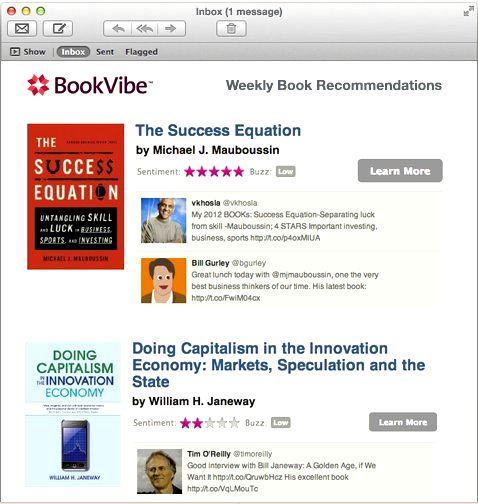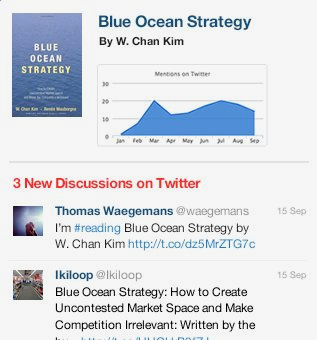Other Social Media Streams in BookVibe’s Future?
Currently, Twitter has rougly 555 million users—not a bad base for a service like BookVibe to try to tap into. However, for as many book discussions as are going on among Twitter’s half a billion users every day, the 1.25 billion people currently registered on Facebook represent an even more attractive userbase for BookVibe to harness.
While CEO Ramesh Haridas did indicate a plan for BookVibe Alerts and Recommendations to branch out to Facebook in the coming months, he also said that accessing Facebook’s 1.25 billion users will be a bit more difficult for the service than accessing Twitter’s 555 million has been.
The reason is Twitter’s sweeping accessibility and Facebook’s corresponding care for privacy. While Twitter discussions and feeds are made completely public by default, Facebook profiles are characterized by a wider array of privacy settings and safeguards—all of which make it a bit harder for an intuitive keyword search tool like BookVibe to work correctly.
According to Haridas, BookVibe will eventually work for Facebook, but not quite with the immediacy of the Twitter version. Where Twitter users can get recommendations and book discussions in their feed by simply entering their username, a Facebook user would have to authorize BookVibe to take a look through their profile and friend lists, slowing down the process a bit.
In addition, Twitter also has a reputation for being a more spontaneous social media stream, and may ultimately prove to be a more fertile ground for book discussions than Facebook. Either way, Facebook’s usefulness for providing book recommendations and discussion alerts should be revealed within the next few months, when BookVibe makes its next big move.
Tech Desk
From the Tech Desk
New Twitter Tool Helps Authors to Engage in Conversations with Readers
Calling all Twitter-active authors and publishers: a new social media tool has recently been unveiled that can help you to engage with discussions about your books in efficient new ways.
This past spring, the social media analytics company Parakweet, Inc. turned its attention to helping readers discover new book recommendations in their social media stream. By simply entering their Twitter username into the service, readers can distill their feeds down from countless Tweets concerning innumerable topics to only the discussions relating to books. The service—called BookVibe Recommendations—was released in May, and according to Parakweet CEO, Ramesh Haridas, the reception for the product from readers has thus far been almost unanimously positive.
 “The initial reaction was that people had no idea that they had all of these book recommendations in their Twitter stream,” Haridas explained. “Quite often, there are books being discussed [on your feed], but if you don’t check Twitter for a few hours or for a few days, those book discussions are getting drowned in the noise. On Twitter, the people you follow tend to have similar interests to you, and the books they are discussing tend to be quite relevant for you. With BookVibe, you enter your Twitter handle, and book recommendations will come back based on who you follow.”
“The initial reaction was that people had no idea that they had all of these book recommendations in their Twitter stream,” Haridas explained. “Quite often, there are books being discussed [on your feed], but if you don’t check Twitter for a few hours or for a few days, those book discussions are getting drowned in the noise. On Twitter, the people you follow tend to have similar interests to you, and the books they are discussing tend to be quite relevant for you. With BookVibe, you enter your Twitter handle, and book recommendations will come back based on who you follow.”
Still, while BookVibe mastered the idea of offering book recommendations via social media, Haridas and the rest of the Parakweet team weren’t quite satisfied. Readers had their analytics system, now Haridas wanted to offer a similarly helpful interface that authors and publishers could use to engage with readers and make educated business decisions. As a result, a new BookVibe Alerts system was born and launched during the last week of November, one which Haridas hopes will take Parakweet’s strong analytics tools to the next level as far as publishing industry reach is concerned.
“We saw there was a massive challenge for authors and publishers in keeping track of the conversations about their books on social streams,” Haridas said. “There are some social media analytics tools out there, but they are quite often complicated and expensive, and require you to log into a special dashboard to keep track of the discussions about your book. So we decided to launch the Alerts feature, which lets you easily keep track of all the discussions about your book right on Twitter.”
For BookVibe, the Alerts feature actually uses a lot of the same functions that define Parakweet’s Recommendations tool. Both products use Twitter to track book discussions and are designed to be presented to users in the form of a tailored email newsletter. However, while the Recommendations tool uses a Twitter handle to gauge book mentions and discussions taking place amongst the people a reader follows on Twitter, the Alerts feature instead tracks the keywords in a book title to help authors find people on Twitter who are discussing their book.

By locating these conversations, authors can find out a plethora of useful information, from their audience demographics to the general reception for their book. Furthermore, the Alerts tool makes it easier than ever before for authors to engage with their readers on social media, hopefully creating new outreach opportunities that can in turn build fanbases and boost author likeability.
Haridas believes that one of the biggest challenges being faced by authors and publishers in the book industry right now is that they don’t really know their readers. There is this wealth of information swirling around on the Internet—and on social media streams in particular—but up until now, most authors and publishers have neither figured out how to harness it, nor how to engage with their readers in real time as their books are being discussed. BookVibe Alerts makes both of those tasks easier, in turn giving the publishing industry a new way to get to know its customers.
Of course, some authors and publishers have been using social media analytics to track reader activity for ages. But according to Haridas, since BookVibe Alerts is designed specifically to track book discussions, it will provide a more efficient way for them to do so.
“Many of these tools out there are general purpose tools and they just track based on keywords,” he said. "But many books have very common names, and if you try to match their titles ok keywords, you would come back with a whole bunch of false positives. With BookVibe Alerts, we use natural language processing technology and look at a whole bunch of other signals to make sure it’s actually a book that’s being discussed. Our accuracy is about 95 percent.”
From authors to publishers to readers, the BookVibe website has something for just about everyone. Readers can try out BookVibe Recommendations by visiting www.bookvibe.com and entering their email to subscribe. Authors or publishers, on the other hand, can visit alerts.bookvibe.com to test out the new Alerts service in Beta mode.
Craig Manning is currently studying English and Music at Western Michigan University. In addition to writing for IndependentPublisher.com, he maintains a pair of entertainment blogs, interns at the Traverse City Business News, and writes for Rockfreaks.net and his college newspaper. He welcomes comments or questions concerning his articles via email, at manningcr953@gmail.com.

